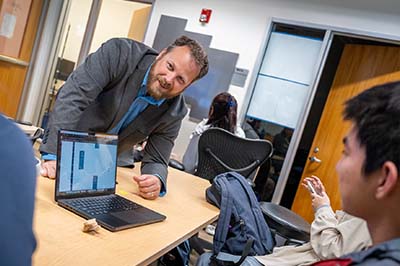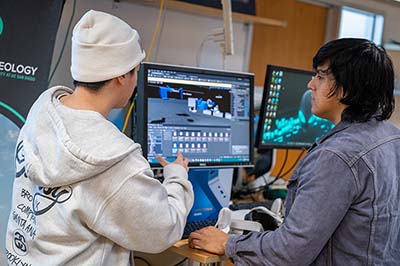The Climate Games
UC San Diego team aims to raise awareness of climate change through unique video game
Story by:
Published Date
Article Content
When UC San Diego Qualcomm Institute (QI) researcher Neil Smith heard that the State of California was launching an initiative to fund original projects addressing climate change, he thought he had an idea that might be a perfect fit to raise awareness of its impact. As it turned out, the proposal reviewers agreed.
Now funded with a $50,000 Climate Action, Resilience, and Environmental Sustainability (CA CARES) grant, Smith will be able to further develop a project called “The Climate Games,” a video game that brings home the realities of our changing world.
Smith, who is co-director of the Center for Cyber-Archaeology and Sustainability as well as associate research scientist at QI, believes games to hold much promise as an educational tool. “Compared to lectures or online articles typically used in education today, game-based learning leads to better engagement, better emotional empathy and better understanding,” he said. “Game-based learning can take advantage of many learning styles, such as verbal and visual—and game-based learning is fun, so people are willing to engage with it more.”

In addition, the potential reach of a video game on a platform like Steam or Epic Online Services is enormous. “These services have a crazy number—like more than 60 million—active users across all of them all around the world,” Smith said, “so you can have a huge audience.”
Partnering with Students
The Climate Games first began to take shape in a Seventh College class, SYN 100, Smith was teaching that challenged undergraduate students to digitally document climate change.
Groups of students were tasked with creating mini-games focusing on specific case studies where climate change was already having a demonstrable effect, particularly on communities with low-income or minority populations. As Smith notes, these are often the people whose health or livelihoods are most impacted.
Locations included the San Joaquin Valley in California’s Central Valley; the Salton Sea in California’s Riverside and Imperial counties; Northern California fire country; Yucatan, Mexico; and the coral reefs of Badu Island near the Great Barrier Reef.
At the end of the quarter, the work on these five case studies was combined into a single game, supported by common game mechanics the class developed, and presented as part of an end-of-class showcase.
Many students were enthusiastic about the effort. “What captivates me most is [the game’s] capacity to elevate global awareness of climate and environmental issues, inviting users to delve into the stories behind these challenges,” said Chung-Ta Huang ’24, an Interdisciplinary Computing and the Arts major in the Visual Arts Department who participated in SYN 100. “It serves not just as a game but as an innovative educational tool that can potentially transform traditional approaches to climate studies.”
The CA CARES funding has enabled Smith to hire several students, including Huang, to further develop The Climate Games, with the ambitious goal of having a version for early access release by the end of the grant period in December.
Building Up and Out
One feature of the game the team has been working on will enable other groups to add their own local stories of climate change to The Climate Games platform, adding to the content for users and encouraging collaboration. The game enables users to craft their narratives, design interactive environments and simulate real-world climate scenarios.
As members of the development team work on the project, they have been balancing the need for the game to be both simple enough to be accessible and complex enough to be engaging. “Creating various small interactions and game mechanisms is a passion of mine,” said Huang, “however, integrating them into a cohesive and user-friendly system presents a significant challenge. As game designers, our task is to smoothly transition users into our game world, ensuring they grasp its rules just as intuitively as those in the real world. Achieving this requires the rules to be both clear and universally applicable, striking the right balance between complexity and accessibility.”

While the CA CARES funding is short-term, Smith sees The Climate Games as a long-term venture. “Our hope is [the CA CARES grant period] gives us enough time to work out a lot of the bugs and continue to develop the game further, and hopefully also find other grants to go forward,” he said. “Like most games similar to this one, we don’t want to just create it, send it out and stop working on it. Once we create the game, we can continue to develop it, making it better and building communities that are passionate about it.”
At UC San Diego, Smith is also further developing academic offerings centered on the development of serious games. He is currently teaching a two-quarter Academic Internship Program course in which 47 students are developing skills with the computer graphics tool Unreal Engine.
Some students are working on projects related to climate change. Others are working on the visualization of chemical reactions, building avatars of historic figures, or the creation of a digital twin of the UC San Diego campus. Another project focuses on weather simulations with real time data, which might later be incorporated into The Climate Games.
Students like Huang are grateful for the opportunity to expand their skills in the field: “As someone dedicated to pursuing a career in interaction design and game design, working on [The Climate Games] project has been an invaluable experience.”
For more information on Smith and his projects, see Smith’s bio and the QI Immersive Visualization Center website.
Learn more about research and education at UC San Diego in: Climate Change
You May Also Like
Stay in the Know
Keep up with all the latest from UC San Diego. Subscribe to the newsletter today.




